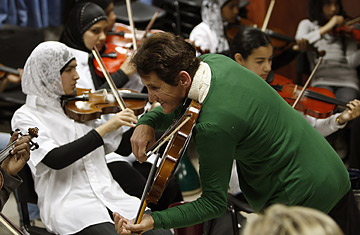
Wafa Younis, head of the "Strings of Freedom" orchestra based in Jenin refugee camp, takes part in a performance for an audience, including about 10 women who survived the Holocaust, in the Israeli city of Holon near Tel Aviv March 25, 2009.
Last week's story of a troupe of young Palestinian musicians from Jenin serenading a group of elderly Jewish Holocaust survivors near Tel Aviv seemed like an improbable ray of hope on a darkening political landscape. Instead, the music has died in Jenin, and the episode has turned into another of those daily tragedies that demonstrate the widening chasm between Israelis and Palestinians.
On March 25, Wafa Younis, 51, a vivacious Israeli-Arab conductor, led her students from the Jenin refugee camp — long a cauldron of resistance against the Israelis — through a medley of Arabic and classical tunes, while the Holocaust survivors clapped along to the violins and the oriental drumming. For the young musicians, raised behind the Israeli security barrier surrounding much of the West Bank, there was an added bonus to the trip: it was the first time many of the kids had seen the Mediterranean sea, which shimmered in the Spring sunshine. The kids even coaxed the event's benefactor, Sheri Arison, a philanthropist and probably Israel's wealthiest woman, onto the dance floor. (See pictures of Israel's recent war in Gaza)
The music may have momentarily bridged the gap between the Israelis and the Palestinians, but mutual incomprehension still lingered. The Palestinian kids had only a dim idea of the Holocaust, which is skimmed over in their history books, while the Holocaust survivors knew only that Jenin's teeming refugee camp had been home to dozens of suicide bombers who had blown up Israeli restaurants and cafes.
But the awkwardness of that mutual incomprehension was nothing compared to the cacophony Younis faced when she brought her musicians back to Jenin, the glow of the beach and musical triumph still on their faces. The trip had provoked the wrath of Zakaria Zubeidi, head of President Mahmoud Abbas' Fatah movement in the area. Zubeidi banished Younis from Jenin, forcing the closure of the music school where she had spent the last six years teaching Palestinian teenagers to play the violin, the Oud and drums. "The children are now crying. They're afraid," Younis told TIME in a telephone interview. "One girl told me she sleeps with her violin hidden under her bed because she's afraid that these men will come in the middle of the night and take it away."
Younis says she was told by parents that armed militants had gone to their houses and warned the children to stay away from her music center. "In one house, the woman kept running to the window to check if anybody was watching us," she says. "The parents, the children, they're all scared."
Younis appears to have underestimated the seething resentment that Jenin's residents harbor towards Israel. The town has long prided itself on being a symbol of Palestinian defiance in the face of Israel's military might. When Israeli troops entered the refugee camp in 2002 to close down the organizations there that had been sending suicide bombers into Israel, they faced fierce resistance; Israel gained control of the camp only after eight days of fighting, during which it lost 23 men and killed some 52 Palestinians, and bulldozed several dozen houses.
The bitterness of Jenin's grim history rebounded on Younis' bridge-building effort. Fatah commander Zubeidi told TIME that the focus of the hostility against Younis was the short presentation on the Holocaust that she delivered to her musicians during the bus ride to Tel Aviv. "She should have been telling them about the current holocaust that the Israelis have been inflicting on the Palestinians for the past 60 years," Zubeidi said. He ordered the conductor out of Jenin, he explained, because of "threats" by "angry Palestinians", including some of the musicians' parents.
Younis is having none of that. She claims that the parents of all the musicians on the trip had signed release forms, knowing that their kids would be playing at a Holocaust survivors' club near Tel Aviv. On Monday, she says, Zubeidi's men went through the narrow lanes of the refugee camp with megaphones ordering parents not to send their children to Younis's music classes. "They have built a high wall between me and the children," she laments.
In a spirit of defiance not unfamiliar in Jenin, however, the indominable orchestra conductor is fighting back. Younis is demanding that President Abbas lift the ban on her teaching music in Jenin. "This is the only music center in all the West Bank, and what have the Palestinian Authorities given me? Nothing. Not a single violin." Younis vows to keep her youth orchestra going, somehow. She concludes an interview with a question of her own: "You don't know where I could get a saxophone, do you?"
—With reporting by Jamil Hamad/Bethlehem
